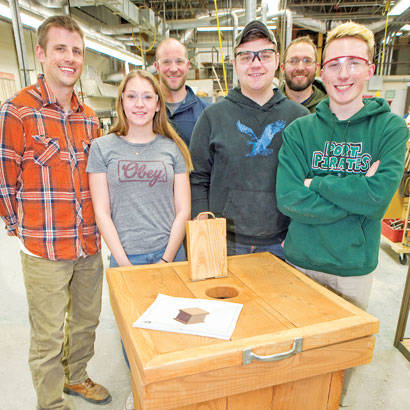
The Port Washington, Wisconsin, Environmental Planning Committee agreed that its park system needed more recycling bins, but because of the prohibitive costs of the bins and lack of budget allocations, acknowledging the problem was about all the committee could do. “Due to the cost of the bins, I was struggling with a way to make it happen,” says Charlie Imig, director of parks and recreation.
As luck would have it, two other unrelated events were unfolding that would result in an innovative approach to meeting the city’s recycling bin needs: Nick Havlik, a technology education teacher at Port Washington High School, was reaching out to local city departments to connect his building construction and woodworking classes with service learning projects in the community. And, Jon Crain, the local city forester and member of the planning committee, was, in his words, “looking for different ways to utilize urban wood, especially the amount of ash trees decimated by the EAB [emerald ash borer].” Crain had recently informed the planning committee that emerald ash borer beetles were killing ash trees throughout the city, and he and Imig saw the synergy that could result from engaging Havlik’s students to use the wood from the decimated local trees to make the needed recycling bins.
The students eagerly embarked on their initial creation of the recycling bins. In mid-March of this year, one of the students created the specs and a model for the project. The students are looking to have 12 recycling bins built by next year. “This is a great benefit to our department,” Crain explains. “We did not have the budget to purchase recycling bins, but now, with the completion of this project, we will be able to further offer recycling receptacles in our park.”
— Daniel Sanford, NRPA’s Administrative Assistant to the CFO

